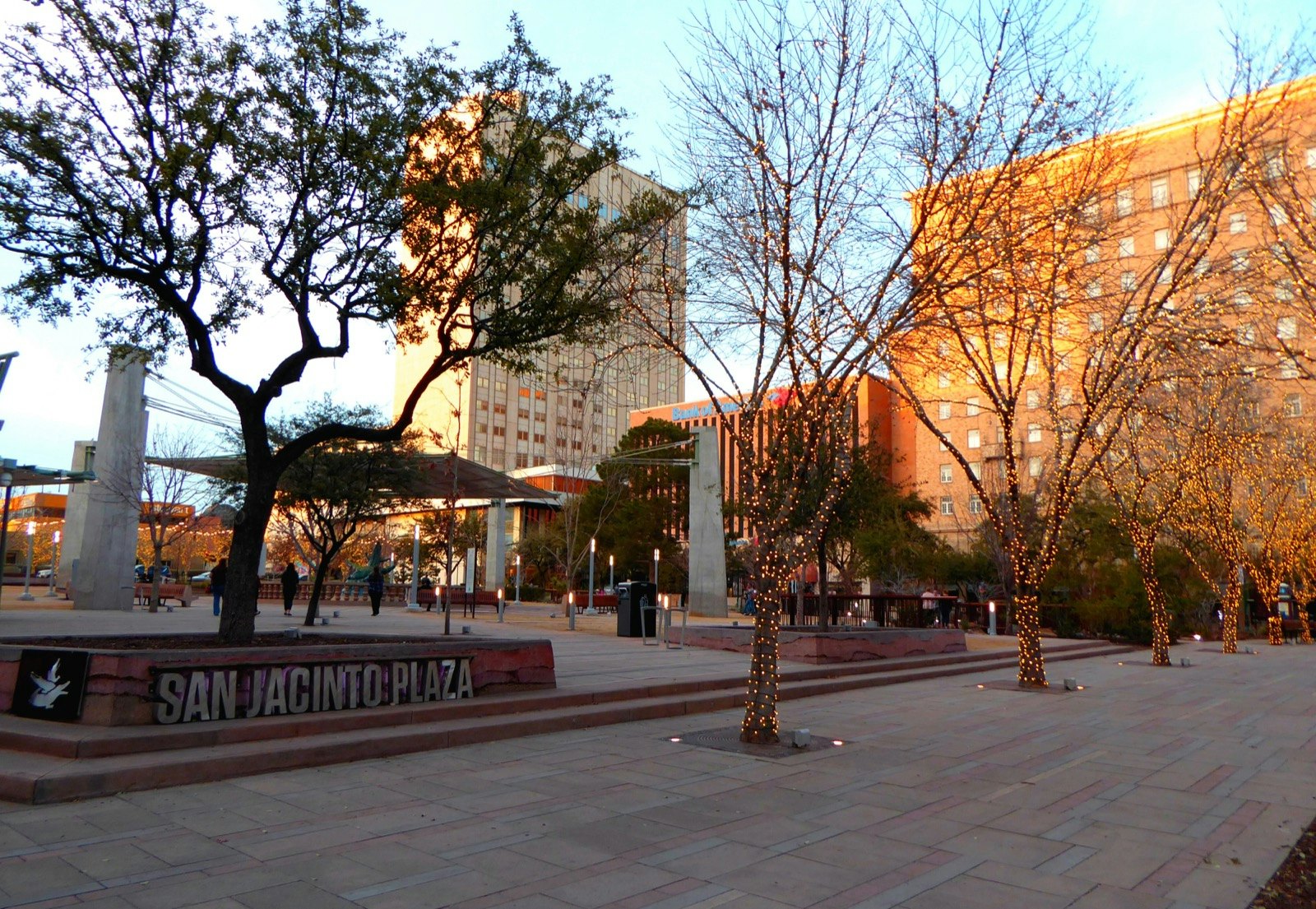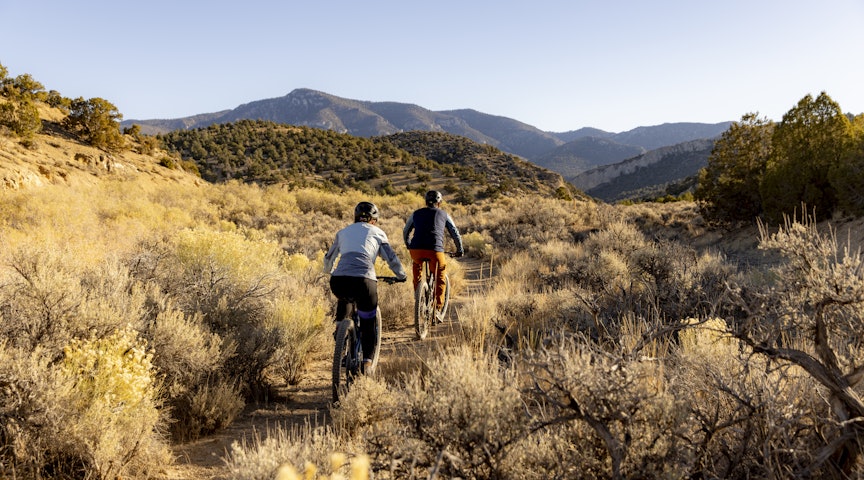

An art deco arch literally welcomes you to El Paso, Texas © Jason Najum / Lonely Planet
El Paso is the westernmost city in Texas – closer to four other state capitals than it is to Austin (Phoenix and Santa Fe in the US; and Chihuahua and Sonora in Mexico). It’s home to several legends – Billy the Kid and Wyatt Earp moseyed down El Paso St. and ghosts supposedly haunt cemeteries and hotels. It’s also known as Sun City, with more than 300 days of desert sunshine per annum.
Yet more than anything else, El Paso is a border town. Previously part of Spanish- and Mexican-controlled New Mexico, El Paso wasn’t an American territory until after 1848. El Paso del Norte ('the northern pass'), was settled by the Spanish almost 400 years ago and since then the realities of border life and multicultural demographics have left an indelible mark on the city and its diverse residents.

Texans, Mexicans, Tejanos, Indigenous Mexicans and Americans – all in some way have called this place home. Today El Paso, and its sister city Juarez, continue this communal relationship. Arriving in town one is immediately hit with a Tex-Mex paradox that seems to define both the city and its people. Am I in Texas or Mexico? Such cultural distinctions are blurred here.
Cowboy boots and corn tortillas, border walls and cross-border communities, one of the nation’s safest cities practically sharing a downtown with one of the world’s most infamously dangerous: welcome to El Paso.

Small-town downtown
El Paso has had some recent makeovers – a trolley line, a charming downtown baseball stadium, and a modern convention center – while still managing to keep much of its heritage and small-town feel. Exploring the center by foot is definitely doable, so grab a hot drink at the Coffee Box – a hip cafe built into stacked shipping containers – or at the trendy District Coffee on Texas Ave. and start your excursion.
Nearby you’ll find the historic Plaza Theater and the El Paso Museum of Art. While exploring, keep an eye out for some of the city’s many murals. El Paso is spotted with compelling street art that highlights a burgeoning and socially-conscious cultural scene. Using San Jacinto Plaza as a starting point, go one block east towards Stanton, or one block west to the museum, and you’ll find impressive murals depicting the realities of daily life around the border.
The Gardner is the city’s oldest hotel. Famed outlaw John Dillinger stayed here and some of the rooms are marketed as 'haunted' (El Paso likes its ghost stories). Among other nostalgic touches, an old-fashioned telephone booth and antique operator’s switchboard decorate the lobby. With simple rooms and dormitory options, the Gardner is a good budget accommodation option in the downtown core.
Around the corner at Franklin Ave and Stanton, a row of LGBT-friendly bars pump techno music while young locals enjoy the city’s welcoming nightlife. Just a few steps away from the action is the heart of downtown, where you’ll find many of El Paso’s banks and corporate offices, as well as the lovely San Jacinto Plaza, a hub for outdoor events and community gatherings.
Like the name of their neighboring Mexican state, the hometown Triple-A team playing in the posh downtown stadium is called the Chihuahuas. El Paso is a growing city on the move, yet one with a seemingly firm grasp of its history and heritage.

A night out in El Paso
Drive a few minutes north of downtown and you’ll find L&J Cafe. This longtime El Paso favorite is part family restaurant, part local hangout, and offers a good taste of the city’s Mexican-American community. With an extensive selection of Mexican dishes and a big central bar, L&J is often filled with regulars enjoying the warm yet lively atmosphere. If there’s a line, have a seat at the bar, order a michelada, and munch on the tasty house chips and salsa.
Next head over to Joe Vinny & Bronson’s Bohemian Cafe in nearby Five Points. This local cafe/restaurant is popular with locals for great coffee and a tasty menu (including good veggie options). It’s perfect for daytime laptop work or chill evening drinks. Offering everything from local craft beers to cafe bon-bon (latin-style espresso with sweet condensed milk), the owners and staff have created a hip but welcoming environment.
The Five Points area has several other nightlife options, like the Living Room Lounge for classy cocktails or Love Buzz for an eclectic range of live music in a funky and unique venue.
El Paso is also a college town, with UTEP (University of Texas at El Paso) adding thousands of students to the city’s nightlife. Check out Cincinnati St. for a selection of cheap beer halls and Top 40 dancing. There’s also Later Later for some chic late-night partying.
If low-key is more your thing, swing by The Tap for a cold one at this classic El Paso dive bar (where they also serve solid Mexican grub), or Deadbeach brewery for locally-made craft brews.

Across the border
The Rio Grande has always been a natural dividing line here. The river begins at the foothills of the Rockies and flows down from Colorado to the Gulf of Mexico, cutting across El Paso and Juarez’s downtown cores. Politics aside, talking about El Paso without talking about the border would simply paint an incomplete picture.
Continue walking a few blocks south from San Jacinto Plaza onto El Paso St. and you’ll notice things changing – the music from the shops, the fresh fruit being sold on the street corners. Walk a few minutes more and, suddenly, there it is – Mexico.
Crossing into Juarez is surprisingly simple, and thousands do it every day. Driving runs the risk of long lines (much busier going into the US than out); or you can walk across the Rio Grande with barely a passport check. All it takes to walk into Mexico is a $0.50 cent fee.
Once in Juarez, you’ll find Ave. Benito Juarez picking up where El Paso St. left off. Walking down this Mexican main street you’ll find souvenir shops and street food and the famous Kentucky Club & Grill, a landmark resto-bar around since the 1920s. A few blocks more and you’ll hit the pedestrian promenade Calle 16 de Septiembre, where on weekend afternoons you’ll find families strolling, older couples dancing to live music, and many traditional food stalls.

To the uninitiated, Juarez can be intimidating. While caution is always recommended and tourist options are limited, the worst years of violence are in the past for now, and Juarez – an industrial city recovering from years of unrest – is doing its best to move forward.
Crossing back is also relatively easy. Just pay another small fee on the Mexican side and take the bridge back over the Rio Grande. Make sure to have your passport, as US customs will be thorough upon re-entry.
Once back on the US side, head over to H&H Car Wash and Coffee Shop. A mix of small-town gas station, American diner and Mexican mom-and-pop shop, this family-owned gem has been around for more than 70 years. Owner Maynard Haddad is a local legend of Syrian descent who’s as Texas as it gets. Residents of all stripes come here to eat bacon and eggs with a side of carnitas and frijoles.
More often than not you’ll find Mr. Haddad holding court outside on some lawn chairs, talking about local stuff the way locals tend to do, sometimes about the border and sometimes not, everyone mixing Spanish and English without a care.
'Under the radar USA' is a series of articles about lesser-known USA destinations. Previous pieces explored Akron, Cheyenne, Columbus, Fredericksburg, Ithaca, Omaha and Paducah.
https://shop.lonelyplanet.com/products/texas-travel-guide-5?via=Z2lkOi8vbG9uZWx5LXBsYW5ldC9Xb3JrYXJlYTo6Q2F0YWxvZzo6Q2F0ZWdvcnkvNTllZTQ5YmRmOTJlYTE0MTg2MDU4Njg2
Take your United States (USA) trip with Lonely Planet Journeys
Time to book that trip to United States (USA)
Lonely Planet Journeys takes you there with fully customizable trips to top destinations – all crafted by our local experts.
























